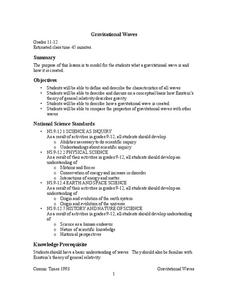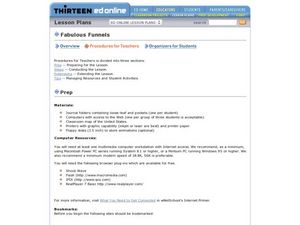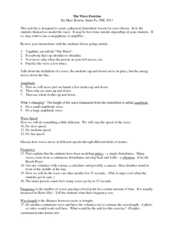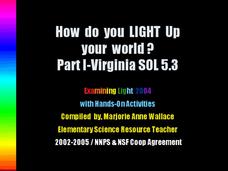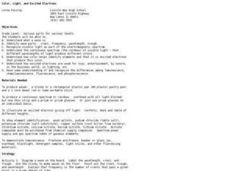NASA
Gravitational Waves
Young scientists participate in a hands-on experiment to explore Einstein's theory of relativity in a creative manner. They investigate various waves and compare their characteristics as they discuss how each wave is created....
Curated OER
Ocean Waves and Tides
Except for a few blurry photos that you can leave out, this is a succinct, yet purposeful presentation. It explains what causes ocean waves, the parts of a wave, and how they break against a shore. It details the cause of tides and...
Curated OER
Earthquakes: Fifth Grade Lesson Plans and Activities
After learning about P waves and S waves, fifth graders view the intensity of earthquakes by examining seismographs and images of earthquake damage. Young scientists then forecasting future quakes by analyzing data about...
Curated OER
Sound Waves
Using a karaoke machine, a guitar, and other devices, learners explore the way sound waves travel. Using this hands on approach, learners can get a better understanding of wavelength, frequency, and more.
Curated OER
Plumbing the Deep-Using Sound Waves to See
Students explore and learn about the concept of echolocation. In this echolocation lesson, students explore how animals and engineers use echolocation (seeing under water) and sound waves to look and hear things under the deep water.
Curated OER
What is a Haiku? How Do You Write a Haiku?
Haiku poetry is explored in this language arts lesson. Yong readers identify the characteristics of haiku and read several examples. Students make connections between their study of Japan and the poetic form of haiku, and they write...
Chicago Botanic Garden
Albedo, Reflectivity, and Absorption
What is reflectivity, and what does it have to do with the Earth's climate? As reflectivity is measured by albedo, scientists can gather information on Earth's energy balances that relate to global warming or climate change. Budding...
Exploratorium
Groovy Sounds
Make music. Class members construct a simple record player using a paper cone and a pin. The resource provides a description of what is happening and why listeners can hear the sounds through the cone.
Mr. E. Science
Characteristics of Waves
Waves, waves, and more waves. Here, class members look at the many types and characteristics of energy waves including transverse, longitudinal, standing, seismic, p-waves, s-waves, and l-waves.
Curated OER
What is a Tornado? How are Tornadoes Created? How are Tornadoes Measured?
Explore the concept of tornadoes with your class. They will research what to do during tornadoes and how to measure tornadoes. Multiple resources are included.
The Science Spot
The Wave Exercise
During a activity on wave motion, physical science participants basically act out the waves as a group. Through their movements, the amplitude, speed, frequency, and wavelength are all identified. Ideas for modeling the reflection and...
Physics Classroom
Name That Harmonic: Open-End air Columns
Ever wonder what really goes on inside a clarinet? Show your young scientists the physics of open-end air columns through an easy-to-use interactive. Learners examine the features of standing waves and calculate frequency and length in a...
Teach Engineering
Earthquakes Living Lab: FAQs about P Waves, S Waves and More
Let's talk about earthquakes .... Using the Internet, pupils research what causes earthquakes, how scientists measure them, their locations, and their effects. The resource is not only informative, but it also builds crucial...
Physics Classroom
Name That Harmonic: Closed-End air Columns
Physics is like music—practice makes perfect! Challenge your class using an interactive that builds harmonic skills. The engaging lesson from a playlist exploring sounds and waves revolves around wave behavior in closed-end air columns....
Discovery Education
Sonar & Echolocation
A well-designed, comprehensive, and attractive slide show supports direct instruction on how sonar and echolocation work. Contained within the slides are links to interactive websites and instructions for using apps on a mobile device to...
Curated OER
How Do You Light Up Your World?
A fabulous presentation on light is here for you. In it, learners view slides which cover many important concepts of light. They understand exactly what light is, what the main sources of light are, what opaque, transparent, and...
Curated OER
Color, Light, and Excited Electrons
Investigate color, light and excited electrons and produce waves using slinkys. Your high schoolers will observe a continuous spectrum with a prism and an overhead projector. They observe flame tests to identify elements and they observe...
Curated OER
How Do You Light Up Your World?
A tremendous presentation on the properties of light. Young scientists are treated to slides which share a lot of fascinating information about light. This impressive PowerPoint is filled with great photos, graphics, and discussion...
Curated OER
Seeing and Feeling Sound Vibrations
Groups rotate through a series of stations and work with a partner to observe sound waves. Children describe sound in terms of pitch, volume, and frequency. To apply their new knowledge, the class considers how these observations can...
Curated OER
The Phenomenon of Sound: Waves
Students explore sound waves. In this sound waves lesson, students brainstorm different sounds and how sounds move or travel. Students then create a KWL chart and work through six different lab activities to examine how sound waves...
Curated OER
Let's Do the Wave!
Learners distinguish waves from matter, differentiate between transverse and longitudinal waves, use sine curves as representations of transverse waves, label characteristic properties of waves, diagram transverse waves having specific...
Exploratorium
A Splash of Color - Is Pure Water Colorless?
What makes the ocean blue but a glass of ocean water nearly colorless? Investigators prepare tubes of water to examine the color of water. Scholars discover the relationship between light absorption, color variations, and water depth as...
Curated OER
Regents High School Examination - Physics 2010
Give every type of learner in your physics class an opportunity to demonstrate what they have learned throughout the year. From analyzing tables and graphs, to evaluating diagrams and solving problems, there is an outstanding variety of...
Curated OER
Sound Waves Simulation Worksheet
In this sound wave learning exercise, students go to http://phet.colorado.edu/new/simulations/sims.php?sim=Sound and run the simulation to complete 28 short answer question.
